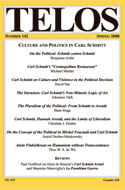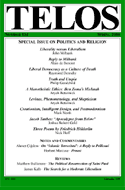By Michael Gorup · Tuesday, May 18, 2010 On Tuesdays at the TELOSscope blog, we reach back into the archives and highlight an article whose critical insights continue to illuminate our thinking and challenge our assumptions. Today, Michael Gorup looks at Hans Sluga’s “The Pluralism of the Political: From Carl Schmitt to Hannah Arendt,” from Telos 142 (Spring 2008).
 The ostensibly simplest questions are always the most deceiving. Socrates, of course, knew this quite well. His childlike questioning, more often than not met with awestruck confusion, has continued to animate philosophical discourse for well over two millennia. The Socratic inheritance—mostly evidently exemplified by the “what is . . . ?” question structure—forms the implicit grounding for Hans Sluga’s comparative study of the political thought of Carl Schmitt and Hannah Arendt. The key question here, of course, is that of politics: namely, “What is politics?” The writings of Arendt and Schmitt form the two most significant twentieth-century corpuses that attempt to answer precisely this question. In Sluga’s account, the primary issue at hand in thinking the political is, for both Arendt and Schmitt, the question of pluralism (or in Arendt’s idiom, plurality). For both thinkers it is fundamental for politics that we are both many and different, though this ontological grounding plays out quite differently in either case. The ostensibly simplest questions are always the most deceiving. Socrates, of course, knew this quite well. His childlike questioning, more often than not met with awestruck confusion, has continued to animate philosophical discourse for well over two millennia. The Socratic inheritance—mostly evidently exemplified by the “what is . . . ?” question structure—forms the implicit grounding for Hans Sluga’s comparative study of the political thought of Carl Schmitt and Hannah Arendt. The key question here, of course, is that of politics: namely, “What is politics?” The writings of Arendt and Schmitt form the two most significant twentieth-century corpuses that attempt to answer precisely this question. In Sluga’s account, the primary issue at hand in thinking the political is, for both Arendt and Schmitt, the question of pluralism (or in Arendt’s idiom, plurality). For both thinkers it is fundamental for politics that we are both many and different, though this ontological grounding plays out quite differently in either case.
Continue reading →
By Ulrike Kistner · Wednesday, May 5, 2010 This text was presented in January at the 2010 Telos Conference, “From Lifeworld to Biopolitics: Empire in the Age of Obama.”
Walter Benjamin’s famous statement, in the eighth of his “Theses on the Philosophy of History” (1940), “the state of exception in which we live is not the exception but the rule,” has become as normalized as its proposition asserts. The phrases turning on the elements “the exception” and “the rule,” have become, in Michael Marder’s terms, matters of “metonymic abuse of modernity.” It plays itself out in the debates in constitutional law and political theory in the 1920s and 1930s.
Continue reading →
By Timothy Stacey · Tuesday, April 27, 2010 Who’s got the X-Factor in UK Politics? A playful look at the debate between John Milbank and Alain de Benoist in Telos 134 (Spring 2006) against the backdrop of the UK general election and other more popular voting shows.
 Voting for pleasure is by no means a new phenomenon, but with the advent of TV reality competition shows the trend has seen exponential growth. Consider this alongside a malaise in British voting trends and a general disaffection with politics, and you begin to see why Simon Cowell, reality TV mogul, is testing the water for a reality politics competition show. The premise: if only we could make politics fun, even silly, then people would be more inclined to vote. It seems an obscure jump to make. But disaffection from politics is inversely proportionate to an increase in ratings for entertainment television. In 2005 more people voted for Big Brother than in the UK general election. Nor is the move unprecedented. The dumbing down of British politics is everywhere. Over the last few months, Dermot O’Leary, host of the X-Factor, has been looking to a host a politics show on the run-up to the UK general election. (Can we hope that it is by now too late?) In February, Pierce Morgan, former host of Britain’s Got Talent, held an unprecedented interview with Gordon Brown regarding his personal life. And in 2005 June Sarprong, originally MTV UK host, got much coveted access to Tony Blair. Voting for pleasure is by no means a new phenomenon, but with the advent of TV reality competition shows the trend has seen exponential growth. Consider this alongside a malaise in British voting trends and a general disaffection with politics, and you begin to see why Simon Cowell, reality TV mogul, is testing the water for a reality politics competition show. The premise: if only we could make politics fun, even silly, then people would be more inclined to vote. It seems an obscure jump to make. But disaffection from politics is inversely proportionate to an increase in ratings for entertainment television. In 2005 more people voted for Big Brother than in the UK general election. Nor is the move unprecedented. The dumbing down of British politics is everywhere. Over the last few months, Dermot O’Leary, host of the X-Factor, has been looking to a host a politics show on the run-up to the UK general election. (Can we hope that it is by now too late?) In February, Pierce Morgan, former host of Britain’s Got Talent, held an unprecedented interview with Gordon Brown regarding his personal life. And in 2005 June Sarprong, originally MTV UK host, got much coveted access to Tony Blair.
Continue reading →
By David Pan · Monday, April 26, 2010 Rituals of Exchange and States of Exception:
Continuity and Crisis in Politics and Economics
January 15-16, 2011
New York City
Whether they allow the circulation of ambassadors or of capital, exchange networks provide the basis for global cross-cultural relationships. Though liberal democratic governments pride themselves on the rationality of their procedures, diplomatic protocols and the give-and-take of parliamentary politics attest to complex customs that lie at the heart of such practices. Similarly, recent crises have demonstrated that international financial markets cannot be reduced to a numbers game, however complex, but function on the foundation of a network of promises whose dependability is a matter of habits. Focusing on the contemporary world, this conference will investigate the rituals and protocols that regulate political and economic relations in areas of stability and the underlying forces that come to the fore in periods of crisis. We encourage submissions of paper proposals from scholars in a variety of disciplines including critical theory, philosophy, literature, politics, theology, anthropology, political economy, and cultural studies.
Continue reading →
By Telos Press · Wednesday, April 21, 2010 In partnership with the Telos Institute, Telos is launching a new annual essay prize competition, inviting graduate students and post-graduate researchers in the humanities to tell the world about their work.
The competition offers young scholars the opportunity to be published in one of the leading international interdisciplinary journals. The panel of judges, which includes the editorial board of Telos as well as outside judges, is looking for creative, fresh, and original contributions in the area of politics, philosophy, critical theory, theology, culture, and the arts. There is no specific question or theme.
The winning essay will be published in a regular issue of Telos in the course of 2011. The winner will be given a free annual subscription to the journal as well as a free copy of a book published by Telos Press of his or her choice.
Continue reading →
By Adrian Pabst · Friday, April 16, 2010  Saturday’s airplane crash killing Poland’s president, Lech Kaczyński, alongside more than ninety other Polish senior civilian (and military) figures happened in Smolensk, near Katyn—the same site where more than 20,000 Polish prisoners of war were murdered by the Soviet secret police NKVD in 1940 on Stalin’s orders, as Victor Zaslavsky’s Class Cleansing: The Massacre at Katyn, published by Telos Press, vividly documents. But last week’s tragedy is no “second Katyn”—contrary to what liberal commentators such as Timothy Garton-Ash would have us believe. Saturday’s airplane crash killing Poland’s president, Lech Kaczyński, alongside more than ninety other Polish senior civilian (and military) figures happened in Smolensk, near Katyn—the same site where more than 20,000 Polish prisoners of war were murdered by the Soviet secret police NKVD in 1940 on Stalin’s orders, as Victor Zaslavsky’s Class Cleansing: The Massacre at Katyn, published by Telos Press, vividly documents. But last week’s tragedy is no “second Katyn”—contrary to what liberal commentators such as Timothy Garton-Ash would have us believe.
Continue reading →
|
|
 The ostensibly simplest questions are always the most deceiving. Socrates, of course, knew this quite well. His childlike questioning, more often than not met with awestruck confusion, has continued to animate philosophical discourse for well over two millennia. The Socratic inheritance—mostly evidently exemplified by the “what is . . . ?” question structure—forms the implicit grounding for Hans Sluga’s comparative study of the political thought of Carl Schmitt and Hannah Arendt. The key question here, of course, is that of politics: namely, “What is politics?” The writings of Arendt and Schmitt form the two most significant twentieth-century corpuses that attempt to answer precisely this question. In Sluga’s account, the primary issue at hand in thinking the political is, for both Arendt and Schmitt, the question of pluralism (or in Arendt’s idiom, plurality). For both thinkers it is fundamental for politics that we are both many and different, though this ontological grounding plays out quite differently in either case.
The ostensibly simplest questions are always the most deceiving. Socrates, of course, knew this quite well. His childlike questioning, more often than not met with awestruck confusion, has continued to animate philosophical discourse for well over two millennia. The Socratic inheritance—mostly evidently exemplified by the “what is . . . ?” question structure—forms the implicit grounding for Hans Sluga’s comparative study of the political thought of Carl Schmitt and Hannah Arendt. The key question here, of course, is that of politics: namely, “What is politics?” The writings of Arendt and Schmitt form the two most significant twentieth-century corpuses that attempt to answer precisely this question. In Sluga’s account, the primary issue at hand in thinking the political is, for both Arendt and Schmitt, the question of pluralism (or in Arendt’s idiom, plurality). For both thinkers it is fundamental for politics that we are both many and different, though this ontological grounding plays out quite differently in either case.  Voting for pleasure is by no means a new phenomenon, but with the advent of TV reality competition shows the trend has seen exponential growth. Consider this alongside a malaise in British voting trends and a general disaffection with politics, and you begin to see why Simon Cowell, reality TV mogul, is testing the water for a reality politics competition show. The premise: if only we could make politics fun, even silly, then people would be more inclined to vote. It seems an obscure jump to make. But disaffection from politics is inversely proportionate to an increase in ratings for entertainment television. In 2005 more people voted for Big Brother than in the UK general election. Nor is the move unprecedented. The dumbing down of British politics is everywhere. Over the last few months, Dermot O’Leary, host of the X-Factor, has been looking to a host a politics show on the run-up to the UK general election. (Can we hope that it is by now too late?) In February, Pierce Morgan, former host of Britain’s Got Talent, held an unprecedented interview with Gordon Brown regarding his personal life. And in 2005 June Sarprong, originally MTV UK host, got much coveted access to Tony Blair.
Voting for pleasure is by no means a new phenomenon, but with the advent of TV reality competition shows the trend has seen exponential growth. Consider this alongside a malaise in British voting trends and a general disaffection with politics, and you begin to see why Simon Cowell, reality TV mogul, is testing the water for a reality politics competition show. The premise: if only we could make politics fun, even silly, then people would be more inclined to vote. It seems an obscure jump to make. But disaffection from politics is inversely proportionate to an increase in ratings for entertainment television. In 2005 more people voted for Big Brother than in the UK general election. Nor is the move unprecedented. The dumbing down of British politics is everywhere. Over the last few months, Dermot O’Leary, host of the X-Factor, has been looking to a host a politics show on the run-up to the UK general election. (Can we hope that it is by now too late?) In February, Pierce Morgan, former host of Britain’s Got Talent, held an unprecedented interview with Gordon Brown regarding his personal life. And in 2005 June Sarprong, originally MTV UK host, got much coveted access to Tony Blair.  Saturday’s airplane crash killing Poland’s president, Lech Kaczyński, alongside more than ninety other Polish senior civilian (and military) figures happened in Smolensk, near Katyn—the same site where more than 20,000 Polish prisoners of war were murdered by the Soviet secret police NKVD in 1940 on Stalin’s orders, as Victor Zaslavsky’s
Saturday’s airplane crash killing Poland’s president, Lech Kaczyński, alongside more than ninety other Polish senior civilian (and military) figures happened in Smolensk, near Katyn—the same site where more than 20,000 Polish prisoners of war were murdered by the Soviet secret police NKVD in 1940 on Stalin’s orders, as Victor Zaslavsky’s 

